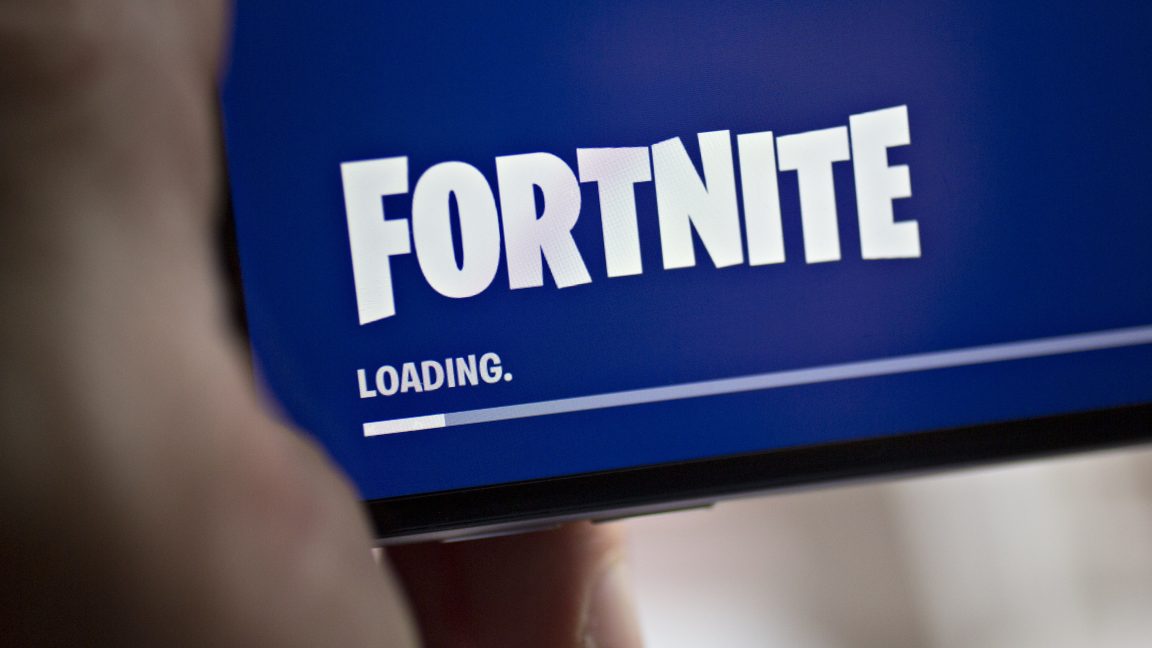Fortnite freed
Fortnite will return to iOS as court slams Apple’s “interference“ and ”cover-up“
Judge refers Apple for criminal contempt over hiding its attempt to thwart a 2021 injunction.
Kyle Orland
–
Apr 30, 2025 8:19 pm
|
65
A Fortnite loading screen displayed on an iPhone in 2018, when Apple and Epic weren't at each other's throats.
Credit:
Andrew Harrer | Bloomberg | Getty Images
A Fortnite loading screen displayed on an iPhone in 2018, when Apple and Epic weren't at each other's throats.
Credit:
Andrew Harrer | Bloomberg | Getty Images
Text
settings
Story text
Size
Small
Standard
Large
Width
*
Standard
Wide
Links
Standard
Orange
* Subscribers only
Learn more
Minimize to nav
Epic CEO and founder Tim Sweeney said in a Zoom call with press Wednesday night that the company is "going to do everything we can to bring Fortnite back to the iOS App Store next week." That decision comes after a federal district court found late Wednesday that Apple was in "willful violation" of a 2021 injunction designed to allow iOS developers to steer customers to alternate payment processors for in-app purchases.
That 2021 injunction wound its way through years of appellate review until January 2024, when the Supreme Court declined to hear a final attempt by Apple to overturn it. Since then, the District Court for Northern California has been holding a series of evidentiary hearings examining the internal development of Apple's so-called "compliance plan" for the injunction.
In a scathing Wednesday night order, District Court Judge Yvonne Gonzalez Rogers determined that Apple had engaged in a plan to "thwart the injunction's goals," and then engaged in an "obvious cover-up" to prevent that plan from being revealed.
Apple's response to the initial injunction "strained credulity," the judge said, by charging a new 27 percent commission for off-app purchases and adding new barriers such as "full page 'scare' screens" to "increase friction" for users seeking off-app payment alternatives. These moves demonstrated Apple's intent to "continue its anticompetitive conduct solely to maintain its revenue stream," the judge writes.
More than that, Judge Gonzalez Rogers said that Apple's in-court testimony in initial hearings on that conduct were in "stark contrast" to evidence that came to the court later via contemporaneous business documents. Those showed that "Apple knew exactly what it was doing and at every turn chose the most anticompetitive option," the judge writes. Apple VP of Finance Alex Roman "outright lied under oath" in testimony about Apple's internal deliberations, according to the court order, while CEO Tim Cook "chose poorly" in actively deciding not to comply with the court's injunction.
Judge Gonzalez Rogers writes that Apple's conduct in court represents a "clear and convincing violation" of her initial injunction that has been referred to the District Attorney for Northern California "to investigate whether criminal contempt proceedings are appropriate."
"Apple’s continued attempts to interfere with competition will not be tolerated," Gonzalez Rogers wrote. "This is an injunction, not a negotiation. There are no do-overs once a party willfully disregards a court order. Time is of the essence. The Court will not tolerate further delays."
In a statement provided to Ars Technica, an Apple spokesperson said, "We strongly disagree with the decision. We will comply with the court’s order and we will appeal."
An Epic return
With the new court order in place, Epic says it will once again submit a version of Fortnite to the iOS App Store in the US in the next week or so. That new version will offer players the option to use standard Apple App Store payments or its own, cheaper "Epic Direct Payment" system to purchase in-game currency and items.
That would mirror the system that was briefly in place for iOS players in August 2020, when Epic added alternate payment options to iOS Fortnite in intentional violation of what were then Apple's store policies. Apple removed Fortnite from the iOS App Store hours later, setting off a legal battle that seems to finally be reaching its conclusion.
For those few hours when Epic Direct Payments were available on iOS Fortnite in 2020, Sweeney said that about 50 percent of customers "decided to give Epic a shot," going through an additional step to register and pay through an Epic account on a web page outside the app itself (and saving 20% on their purchase in the process). The other roughly 50 percent of customers decided to pay a higher price in exchange for the convenience of paying directly in the app through the iOS account they already had set up, Sweeney said. "Consumers were making the choice... and it was a wonderful thing to see," he said.
Speaking the the press Wednesday night, Sweeney said the new court order was a "huge victory for developers" looking to offer their own payment service alongside Apple's on iOS devices. "This is what we've wanted all along," he said. "We think that this achieves the goal that we've been aiming for in the US, while there are still some challenges elsewhere in the world."
While Sweeney said the specific iOS developer account Epic used to publish Fortnite in 2020 is still banned, he added that the company has several other developer accounts that could be used for the new submission, including one it has used to support Unreal Engine on Apple devices. And while Sweeney allowed that Apple could still "arbitrarily reject Epic from the App Store despite Epic following all the rules," he added that, in light of this latest court ruling, Apple would now "have to deal with various consequences of that if they did."
Kyle Orland
Senior Gaming Editor
Kyle Orland
Senior Gaming Editor
Kyle Orland has been the Senior Gaming Editor at Ars Technica since 2012, writing primarily about the business, tech, and culture behind video games. He has journalism and computer science degrees from University of Maryland. He once wrote a whole book about Minesweeper.
65 Comments










